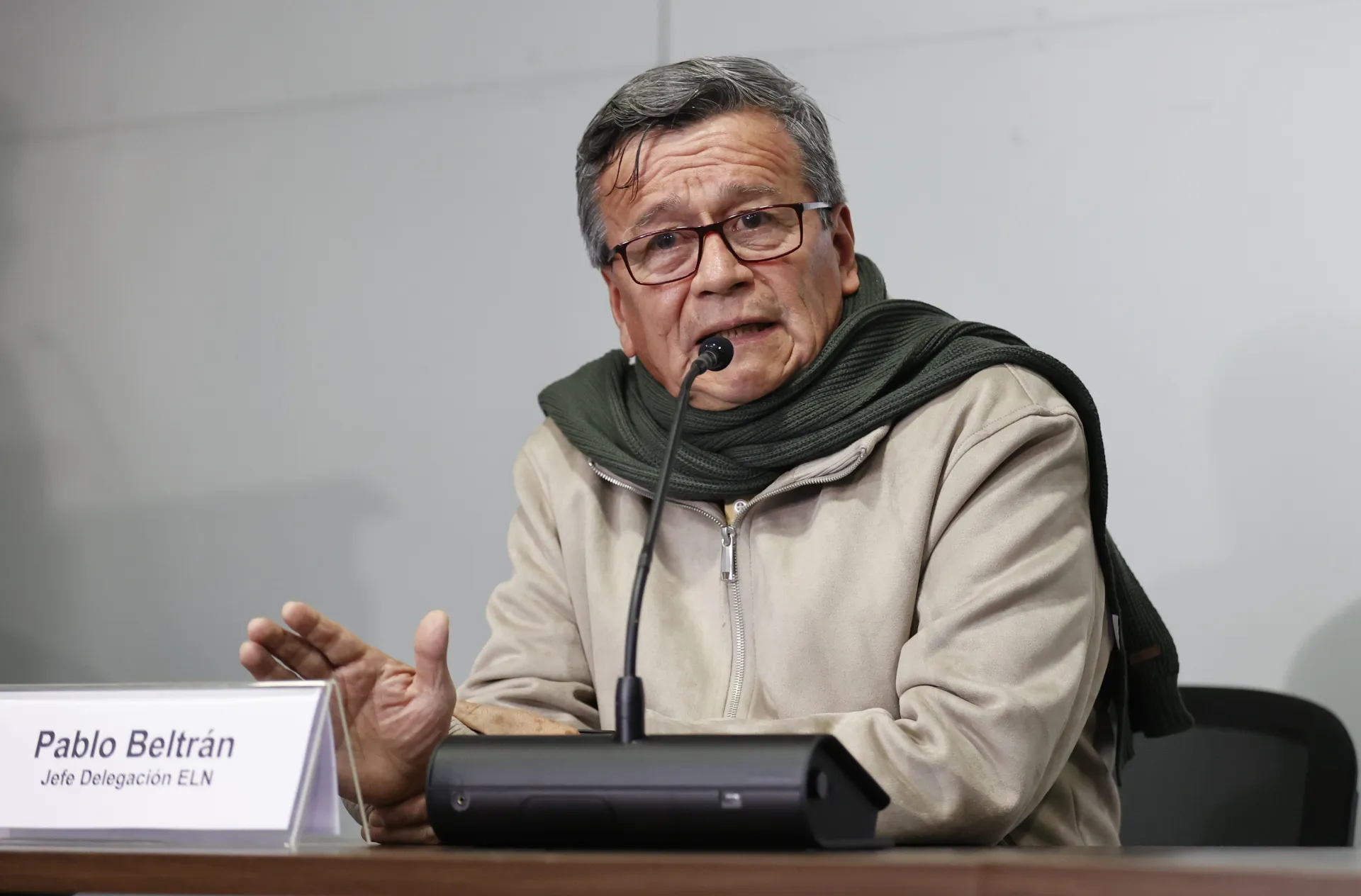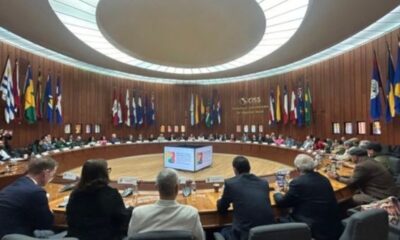International
ELN says that resuming kidnappings for economic purposes is not an ultimatum to the Government

The guerrilla of the National Liberation Army (ELN) does not believe that resuming kidnappings for economic purposes, as announced on May 6 after agreeing to its suspension in February, is an “ultimatum” to the Government but a “record” of its “will to continue looking at a search for a way out of this matter.”
This was stated in an interview with EFE by the chief guerrilla negotiator, Israel Ramírez Pineda, known as ‘Pablo Beltrán’, who assured that the announcement to end the suspension of that crime was nothing more than expected, since his commitment was to suspend it for three months until they found another solution.
This is because in Havana, when the extension of the ceasefire was negotiated, which was where this commitment of the ELN to suspend “withholdings for economic purposes” was incorporated, this was done as a sign of the goodwill of the guerrillas, he explains.
“The ELN can increasingly commit to incorporating more prohibited actions on cessation, but the ELN also needs support to sustain the cessation,” he says. That is, they expected a guerrilla financing solution to be negotiated, which has a source of income in kidnappings.
“That is the political will, but in the discussion we did not manage to reach an agreement on that, that is, when we renewed this cessation there was no agreement to include in the extension the cessation of withholdings,” said Beltrán, although even so, he adds, the ELN included its commitment “on a voluntary basis to make a unilateral cessation of three months, while we find solutions.”
However, those three months have passed since the meeting in Havana and “the Bureau (of dialogues) entered a very difficult crisis and those solutions that we left to make were not worked on. Then the three months passed, but we were not able to advance the solutions. There was a gap.”
“Then we were forced to say until May 3 was the unilateral cessation (of withholdings for economic purposes) and we hope that we will resume the discussions again, to see if we reach an agreement in that sense. So, it is not an ultimatum but a record that we have the will to continue looking at a search for a way out of this issue that is expected to be included in the prohibited actions,” Beltrán emphasizes.
The two parties have signed the first point of the six on the negotiating agenda in Caracas, but the crises and open disputes have meant that a new cycle of dialogues has not been made since the end of January.
Now they will have to be found again to, among other matters, see if the ceasefire is extended once again, which began on August 3 and will fulfill, for the first time in the history of the guerrillas, a year without breaches.
It is in that new negotiation where the ELN hopes that, if there is compliance by the Government, more prohibited actions, such as kidnappings, will be added.
Despite the fact that International Humanitarian Law (IHL) considers the taking of hostages (the capture of a civilian outside the conflict) as a war crime, for the ELN the “retention” of civilians for economic purposes is not because it is a “temporary detention.”
“That type of withholding, above all, we focus on characters who have been enriched with the corruption of the treasury. That is a policy, that is, to expropriate corrupt (…) So it is not only to expropriate for expropriate, no, it is to the corrupt,” explains Beltrán.
Thus, the guerrillas point out that “they charge tributes” and that when they do not comply, it is when “a temporary arrest is made.”
“I don’t want to compare, but there are many countries in the world that if you don’t pay taxes, they stop you. Well, that’s it, it’s a temporary detention and for us it’s not hostage-taking,” says the head of the ELN delegation at the dialogue table.
Central America
Senator Van Hollen Meets with Deported MS-13 Member in El Salvador; Trump and Bukele React

U.S. Democratic Senator Chris Van Hollen, representing the state of Maryland, held a meeting in El Salvador with deported MS-13 gang member Kilmar Ábrego García, a member of the criminal group classified by the U.S. government as a terrorist organization.
“Kilmar Ábrego García, miraculously resurrected from the ‘extermination camps’ and ‘torture chambers,’ now sipping margaritas with Senator Van Hollen in the tropical paradise of El Salvador!” wrote President Nayib Bukeleon X (formerly Twitter), sharing photos of Van Hollen, Ábrego García, and a lawyer sitting together at a Salvadoran hotel.
The deported gang member is seen wearing a plaid shirt and a flat-brimmed cap, seated at a table with glasses and coffee cups. The senator also shared images of the meeting on his own social media accounts.
Bukele reaffirmed that Ábrego will remain in El Salvador and will not be returned to the United States.
“Now that his health has been confirmed, he has earned the honor of remaining under the custody of El Salvador,” Bukele added.
Former U.S. President Donald Trump criticized the senator’s meeting with Ábrego on Truth Social, calling Van Hollen “a fool” for advocating for Ábrego’s return to the U.S.
International
Pope Francis Appears for Easter Blessing, Calls for Peace and Religious Freedom

Pope Francis, still recovering from pneumonia, appeared on the balcony of St. Peter’s Basilica in the Vatican on Easter Sunday and, with a faint voice, wished a “Happy Easter” to the thousands of faithful gathered to celebrate the Resurrection of Christ.
A month after being discharged from a lengthy hospital stay, the presence of the 88-year-old pontiff had remained uncertain, with the Vatican not confirming his attendance ahead of time.
Eventually, the pope made a brief appearance in a wheelchair shortly after 12:00 p.m. (10:00 GMT) to deliver his traditional “Urbi et Orbi” blessing (“to the city and to the world”).
Although no longer wearing an oxygen cannula, the Argentine Jesuit relied on a close aide to read his Easter message, which touched on major global conflicts.
Francis condemned the “dramatic and unworthy humanitarian crisis” in Gaza and called for a ceasefire, while also expressing concern over the “growing climate of antisemitism spreading across the globe.”
He further emphasized the importance of religious freedom and freedom of thought, stating that without mutual respect, “peace is not possible.”
International
Thousands rally nationwide against Trump’s threat to U.S. democracy

Thousands of protesters gathered on Saturday (April 19, 2025) in major cities like New York and Washington, as well as in small communities across the United States, in a second wave of demonstrations against President Donald Trump. The crowds denounced what they view as growing threats to the country’s democratic ideals.
In New York City, demonstrators of all ages rallied in front of the Public Library near Trump Tower, holding signs accusing the president of undermining democratic institutions and judicial independence.
Many protesters also criticized Trump’s hardline immigration policies, including mass deportations and raids targeting undocumented migrants.
“Democracy is in grave danger,” said Kathy Valyi, 73, the daughter of Holocaust survivors. She told AFP that the stories her parents shared about Adolf Hitler’s rise to power in 1930s Germany “are happening here now.”
In Washington, demonstrators voiced concern over what they see as Trump’s disregard for long-standing constitutional norms, such as the right to due process.
-

 International4 days ago
International4 days agoArsenal stun Real Madrid at the Bernabéu to reach Champions League semifinals
-

 Central America3 days ago
Central America3 days agoNicaraguan Exiles to Mark 7th Anniversary of 2018 Protests with Global Commemorations
-

 International3 days ago
International3 days agoDominican ‘False Hero’ Arrested for Faking Role in Nightclub Collapse That Killed 231
-

 International2 days ago
International2 days agoACLU seeks emergency court order to stop venezuelan deportations under Wartime Law
-

 International4 days ago
International4 days agoBogotá residents line up for yellow fever vaccine amid national alert
-

 International4 days ago
International4 days agoDeSantis’ immigration crackdown sparks alarm in Venezuelan Communities in Doral
-

 Central America2 days ago
Central America2 days agoUN complaint filed against Costa Rica over detention of migrant children
-

 International4 days ago
International4 days agoMexico refuses to restore ties with Ecuador while Noboa remains in office
-

 International22 hours ago
International22 hours agoThousands rally nationwide against Trump’s threat to U.S. democracy
-

 International4 hours ago
International4 hours agoPope Francis Appears for Easter Blessing, Calls for Peace and Religious Freedom
-

 Central America4 hours ago
Central America4 hours agoSenator Van Hollen Meets with Deported MS-13 Member in El Salvador; Trump and Bukele React





















